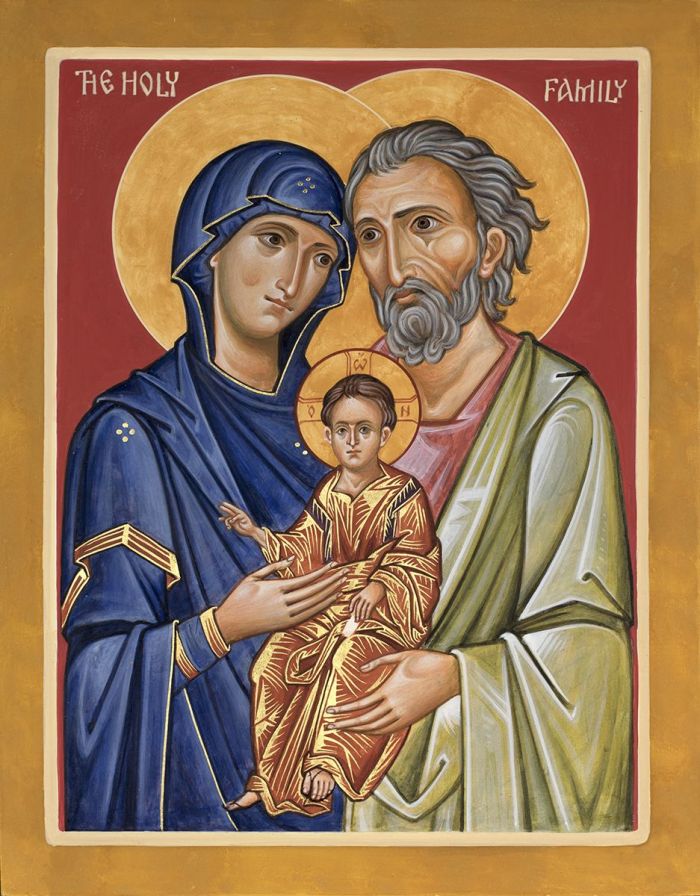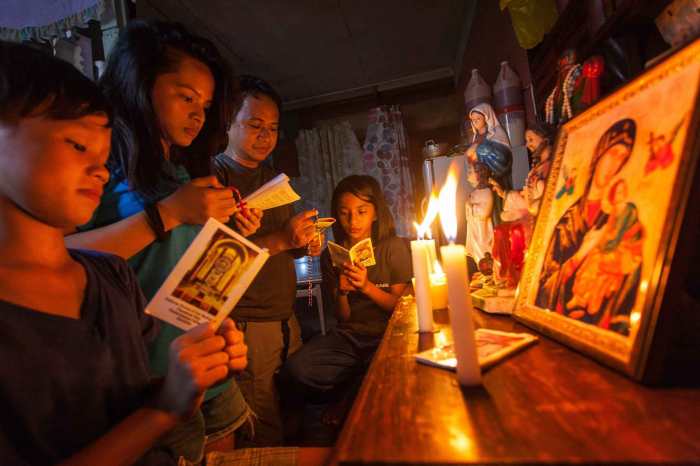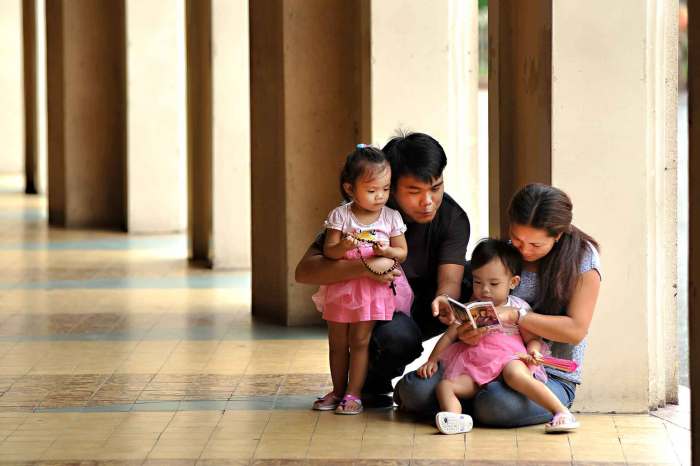
Christmas is a season for the family. It is the time of the year when all the members of the family needs to be together to celebrate Christmas. Each member of the family wherever he/she is, even if it is from the farthest point on earth, needs to come home to their families on Christmas.
Today, on the last Sunday of 2019, we celebrate the Feast of the Holy Family of Jesus, Mary and Joseph. The Feast of the Holy Family is very much a part of the Christmas season. The Christmas story of God becoming human also involves the coming of God into a human family—the family of Mary and Joseph. God became man and dwelt amongst human family. Jesus, the son of God, experienced the joys and the hopes, the griefs and anxieties that any ordinary human family goes through. Thus, Christmas is the birth of God in the family in whatever situation we find our families today.
As we commemorate the dwelling of Jesus in our family on Christmas, we are called to become truly present to each member of our families. To be present to one another is to truly listen and accept each other. To be present to one another is to forgive and ask forgiveness from each other. Pope Francis wrote that forgiveness is essential in any family since there is no perfect family,
“There is no perfect family. We do not have perfect parents, we are not perfect, we do not marry a perfect person or have perfect children. We have complaints from each other. We disappoint each other. So there is no healthy marriage or healthy family without the exercise of forgiveness. Forgiveness is vital to our emotional health and spiritual survival. Without forgiveness the family becomes an arena of conflict and a stronghold of hurt. “

In the 2nd reading, St. Paul, in his letter to the Colossians, talks about forgiveness and more on what it means to bring Christ into our family:
Put on, as God’s chosen ones, holy and beloved,
heartfelt compassion, kindness, humility, gentleness, and patience,
bearing with one another and forgiving one another,
if one has a grievance against another;
as the Lord has forgiven you, so must you also do.
And over all these put on love,
that is, the bond of perfection.
And let the peace of Christ control your hearts,
the peace into which you were also called in one body.
And be thankful.
Let the word of Christ dwell in you richly,
as in all wisdom you teach and admonish one another,
singing psalms, hymns, and spiritual songs
with gratitude in your hearts to God.
Joseph, Mary and Jesus, like any human family, encountered many hardships and problems. In the gospel today, we hear of the the Holy Family suffered persecution when Herod ordered the execution of all young male children in the vicinity of Bethlehem, so as to avoid the loss of his throne to a newborn King of the Jews whose birth had been announced to him by the Magi. Joseph and Mary carrying the baby Jesus had to flee to Egypt to escape from the terror unleash by the tyrant Herod. The Holy Family, while raising up Jesus, had to endure the hardships and exploitation in 1st century Palestine under the Roman empire.
Thus, Christmas calls us to face the real situation and issues of our families inasmuch as it is a joyful time of gathering as a family. The joy that Christmas brings to the family is not an escapist joy nor it is the fleeting joy that numbs us and forgets all about the pain and sorrow within the family.
Like most families in our world today, the holy family was not a well-to-do family; they had to work hard to make ends meet. At an early age, Jesus learned the value of hard work and dedication. Jesus grew up to be a carpenter, just like Joseph (Matthew 13:55; Mark 6:3). The holy family developed in the grace of God. They became open to God’s grace through their constant prayer as well as striving to do the will of God in their everyday lives.
Through these ways, the holy family is a model for every human family. Pope Emeritus Benedict XVI spoke about this, especially the value of prayer, in a beautiful address on December 28, 2011, at a Wednesday audience,
The Holy Family is an icon of the domestic Church, which is called to pray together. The family is the first school of prayer where, from their infancy, children learn to perceive God thanks to the teaching and example of their parents. An authentically Christian education cannot neglect the experience of prayer. If we do not learn to pray in the family, it will be difficult to fill this gap later. I would, then, like to invite people to rediscover the beauty of praying together as a family, following the school of the Holy Family of Nazareth.

When Jesus became a grown up man and had to leave Joseph and Mary to begin his ministry, Mary and Joseph had to step aside for the mission of Jesus. They had accepted the fact, early on, that God’s mission even goes beyond the family.
When Jesus began his ministry, he preached the good news of God’s kingdom. In God’s kingdom, Jesus will gather a new family under God the Father which goes beyond family, blood, race, and culture. Mary has to give way to the new family that Jesus proclaimed and remained obedient and supportive of the mission of her son despite her lack of understanding. As Pope Benedict XVI states,
Then, when Jesus began his public ministry, [Mary] had to step aside, so that a new family could grow, the family which it was his mission to establish and which would be made up of those who heard his word and kept it (cf. Lk 11:27f).[1]
We find this in the gospel particularly in a scene in the gospel of Mark (Mark 3: 31 – 35). At a time when Jesus was persecuted and falsely accused, his mother and brothers were concerned about his welfare. So they went out to Jesus who was in the country preaching the gospel to the people. Surrounded by a crowd while Jesus was preaching, the word was passed on to Jesus: “Your mother and your brothers are outside asking for you.” Jesus’ response was “Who are my mother and my brothers?”
American scripture scholar Raymond Brown commented that Jesus’ response raises the issue of who really constitute his family now that the Kingdom of God is being proclaimed. As his natural family stands outside, Jesus looks at those inside and proclaims, “Here are my mother and my brothers. Whoever does the will of God is brother and sister and mother to me.”[2] Jesus’ response to the crowd is consistent with his other words to those wishing to follow him as he continues to proclaim the Kingdom of God:
Truly I tell you, there is no one who has left house or brothers or sisters or mother or father or children or fields, for my sake and for the sake of the good news, who will not receive a hundredfold now in this age—houses, brothers and sisters, mothers and children, and fields, with persecutions—and in the age to come eternal life (Mark 10: 29 – 30).
In these remaining days of 2019, let us thank the Lord for the many blessings and guidance God has bestowed upon us throughout this year. As one family modeled after the Holy Family, let us, once again, ask God for every spiritual blessing and grace towards a fruitful New Year 2020.
[1] Pope Benedict XVI, Spe Salvi, 2007, #50.
[2] Raymond E. Brown, J.A. Fitzmyer, and K.P. Donfried, eds., Mary in the New Testament (Mahwah, NJ: Paulist Press, 1978), 52 – 53.
